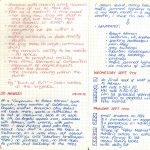As part of your submission for task four you need to write a final reflection which is:
A substantial blog post which considers and reflects on what you’ve learnt throughout the semester. You should critically assesses your studio experience, your own performance and, the success of your final project in relation to the noticing process(es) you employed. This post should make connections between research, project and practice.
This reflection is substantial because you need to combine a reflection on your experience of the studio as a whole and your final task four project. So, really it should be at least double the length of the reflections you have written so far throughout the semester.
In today’s Wednesday workshop we will return to the questions we posed at the beginning of the semester about noticing to see how far we have come, and this might provide a starting point for you to start drafting your reflection on your experience throughout the semester. These questions were posed in response to the John Mason reading:
- How do you develop the skill of purposefully noticing?
- Is noticing a negative thing?
- Different people notice different things, so what influences people to be selective of different things?
- Can noticing be personal and circumstantial?
The first question should be something you can all answer now through your projects, where your final reflection will really be about articulating, and answering –
How do the ways of making media you have developed throughout the semester allow you to see the unseen?
A nice thing to come out of this studio and semester is a way of making media which allows you and those viewing your work to see the unseen. So, how well does your work allow this to happen?
Please remember that a reflection allows you to be critical of your work and if you know there are things not quite working it’s great to reflect on that – we rarely make perfect work. So, what does your work not do so well? Why? How could you improve it, or think about it differently?
In response to the studio’s aims you might want to ask yourself –
- How well have I grasped noticing as an experimental approach to making nonfiction?
- How well have I explored the creative possibilities of making media outside of traditional linear production methods?
- How do the media artefacts I have made (particularly task four) come close to performing the complexity of the changing world around me?
And lastly in terms of reflecting on task four return to your “biggest thing” that you wanted to know or learn through doing this task. Has making this project allowed you to know what you wanted to know? How? What else did you learn through the process?

